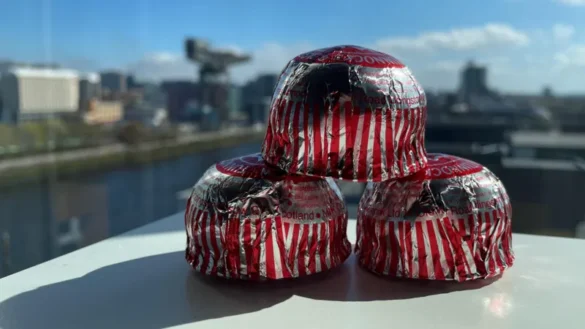For nearly 60 years, an unusual legend has circulated in Royal Air Force (RAF) circles, Tunnock’s teacakes, the beloved chocolate-covered marshmallow treats, were allegedly banned from flights after an unexpected mid-air “explosion.” Now, modern testing has finally put this story to rest, clearing the Scottish delicacy for high-altitude missions once again.
The tale dates back to the Cold War era, when RAF bomber crews reportedly developed a taste for the snack during long training sorties. In 1965, one particular flight took a messy turn when a captain and student pilot left unwrapped teacakes on the instrument panel. During an emergency depressurization drill, the sudden change in cabin pressure allegedly caused the treats to burst, covering the cockpit in sticky marshmallow and rendering crucial instruments unreadable.
The incident became an RAF legend, leading to the widespread belief that Tunnock’s teacakes were too volatile for high-altitude flights.
Determined to uncover the truth, the RAF Centre of Aerospace Medicine recently conducted rigorous experiments at RAF Henlow in Bedfordshire. Using an altitude chamber, typically reserved for training fast-jet pilots, scientists subjected teacakes to extreme conditions.
The tests simulated rapid decompression, lifting the teacakes from ground level to 8,000 feet before suddenly dropping cabin pressure to 25,000 feet in just three seconds. The results? While the expanding air inside the marshmallow filling did cause minor cracks in the chocolate shell, the teacakes did not “explode” as the old RAF tale suggested.
BFBS reporter Hannah King, who witnessed the experiment, confirmed: “The mallow expanded and puffed out, but they did not appear to explode or pose any risk to in-flight safety.”

Further experiments revealed a surprising detail, freezing the teacakes before takeoff made them even more resilient. When stored in their foil wrappers and kept frozen, they maintained structural integrity much better than their room-temperature counterparts.
Dr. Oliver Bird, an instructor at the RAF Centre of Aerospace Medicine, shared his professional advice for pilots with a sweet tooth: “The best approach is to keep them frozen and wrapped until you’re ready to enjoy them.”
Tunnock’s, the family-run confectionery based in Uddingston, near Glasgow, has yet to officially comment on the findings. However, for fans of the iconic treat, this revelation means one thing, Tunnock’s teacakes can officially reclaim their place as a high-flying snack of choice.
With modern science disproving an enduring aviation myth, RAF pilots can now indulge in Scotland’s legendary teacake with confidence, at any altitude.



